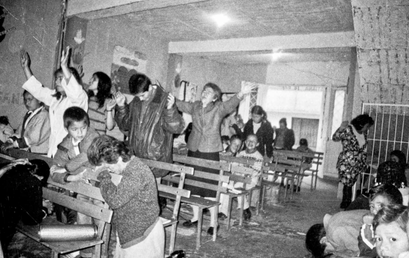
Shooting Cameras for Peace:
Youth, Photography, and
the Colombian Armed Conflict
Disparando Cámaras para la Paz:
Juventud, Fotografía y
el Conflicto Armado Colombiano”

As a young Fulbright scholar in Bogotá determined to democratize the photographic gaze and bring new visions and voices to public debate about Colombia’s armed conflict, Alexander L. Fattal founded Disparando Cámaras para la Paz (Shooting Cameras for Peace). The project taught photography to young people in El Progreso, a neighborhood on the city’s outskirts that was home to families displaced by violence in the countryside. Cameras in hand, the youth had a chance to record and reimagine their daily existence.
Shooting Cameras for Peace / Disparando Cámaras para la Paz is a penetrating look at one of Latin America’s most dynamic participatory media projects. The haunting and exuberant photographs made under its auspices testify to young people’s will to play, to dream, and to survive. The images bear witness to the resilience and creativity of lives marked by a war that refuses to die.
With text in English and Spanish, Shooting Cameras for Peace / Disparando Cámaras para la Paz makes vital contributions to studies of collaborative media, photographic activism, and peace and conflict in Colombia. Fattal’s insightful text offers critical reflection on the genre of participatory photography and the structural challenges faced by similar media projects.
“The haunting photographs in Shooting Cameras for Peace will leave you unsettled and moved. Alex Fattal’s ethical and political commitments are boldly present, even as he submits the terms of his own initiative to searching, critical examination. This is an example of engaged anthropology at its best.”
“Las inquietantes fotografías de Disparando Cámaras para la Paz lo dejarán perturbado y conmovido. Los compromisos éticos y políticos de Alex Fattal se hacen patentes, incluso cuando somete los términos de su propia iniciativa a un examen escrudriñador y crítico. Este es un ejemplo óptimo de la antropología comprometida”.
KAREN STRASSLER,
author of / autora de Demanding Images: Democracy, Mediation, and the Image-Event in Indonesia
“This book is a paean to the piercing wisdom of children, an examination of the vagaries of representation, and a resounding challenge to a horribly frayed social contract that displaces empathy with terrifying violence. It is an astonishing portrait of lives as they are lived.”
“Este libro es un himno a la sabiduría penetrante de los niños, un examen de los caprichos de la representación y un desafío rotundo a un contrato social horriblemente desgastado que sustituye la empatía por una violencia aterradora. Es un retrato asombroso de cómo se viven sus vidas”.
FRED RITCHIN
author of / autor de Bending the Frame: Photojournalism, Documentary, and the Citizen
“Las fotografías tomadas por los jóvenes de Altos de Cazucá presentan la inagotable cotidianidad de sus vidas de una manera exquisita. Este libro no es solo un homenaje a las luchas diarias de esa comunidad, sino también un llamado a repensar la auto representación en la época del selfie”.
“The photographs taken by the young people of Altos de Cazucá exquisitely present the infinite worlds of their everyday lives. This book is not only an homage to the daily struggles of that community but also a call to reconsider self-representation in the era of the selfie.”
FEDERICO RIOS
photographer / fotógrafo








